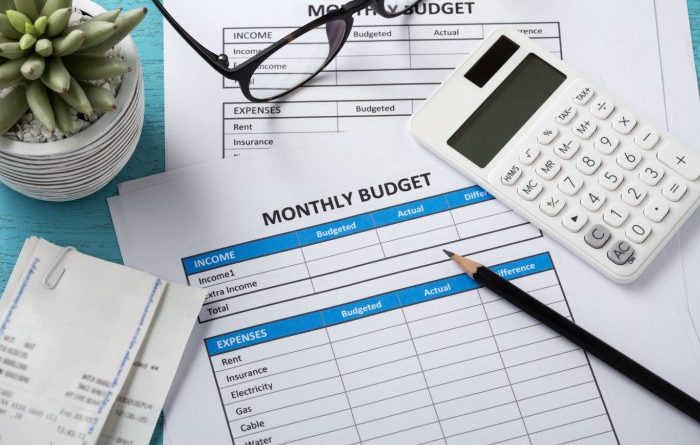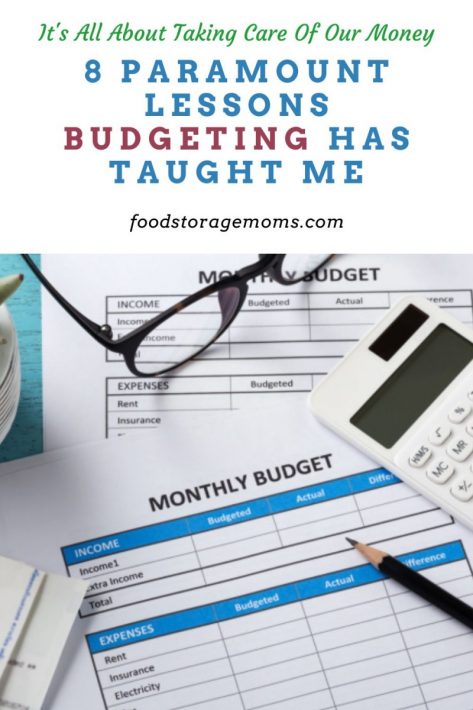Original Article
By Linda Loosli

We feel we’ve lost control of our daily finances when we see prices for so many things go up every day. Let’s work together to figure out how best to deal with these financial challenges.

What is Budgeting?
Budgeting is the process of allocating your money towards different expenses, with the goal of saving money or at least being able to cover the expenses necessary to run the household. This should include creating a budget plan for your monthly spending, setting aside money for a rainy day fund, and planning for large purchases you see coming down the road.
Why Is Budgeting Important?
Budgeting is important because it helps you make the most of your money. When you budget, you are forced to think about your spending and make choices about how to most wisely spend your money. This can help you save money and make better financial decisions.
8 Paramount Lessons Budgeting Has Taught Me
Budgeting has been one of the most important lessons I’ve ever learned. It’s not always easy, but it’s worth it. Here are 8 of the most important lessons:
1. To Be Intentional With Finances
Budgeting has been a game-changer for me when it comes to my finances. Before I started budgeting, I felt like I was just throwing money around without any real purpose or plan. But once I started tracking my spending and creating a budget, I realized that I could be so much more intentional with my money.
It has taught me to be mindful of every purchase I make, and to think about whether or not it aligns with my financial goals. It’s also helped me to be more disciplined when it comes to spending and saving up for things that are important to me. The words “wants” and “needs” come to mind when you put your budget plan together, and sometimes it’s hard to differentiate.
2. To Prepare for Unexpected Expenses
Budgeting has definitely helped me to become more prepared for unexpected expenses. I’ve been able to use budgeting to set aside money each month so that I’m not totally caught off guard by an unexpected bill. Overall, budgeting has been a really helpful tool in making sure that I’m always prepared for whatever comes my way.
Not only has it helped me prepare for unexpected expenses, but it has helped me prepare for any unexpected situation. If you want to learn more about that, read my book Prepare Your Family for Survival: How to Be Ready for Any Emergency or Disaster.
3. To Live Within My Means
Budgeting has taught me a lot about living within my means. This has been a huge help in keeping my finances in order, and it’s also helped me to avoid getting into debt. I’m so glad my mother taught me to make bread and to plan a weekly menu before I go grocery shopping, which is a huge money saver when it comes to buying food for our family.
When I worked at a bank I taught a lot of my clients how to live on less every single month. We would go over their bank statements and break the expenses paid into categories. It was a shock to most how they were spending their hard-earned dollars. More was going into meals out and recreation than they ever imagined.
Others only used cash, so I suggested to them to write down every time they bring out cash to buy or pay for something. After a month or two we would meet again, if needed, to help change spending habits as appropriate.
4. Financial Boundaries
Helping others financially was always something I tried to do when I could, but I knew that I had to protect our retirement dollars. In other words, if I needed to help someone cover their expenses, this could possibly hurt my family when we decided to set money aside for our own needs, including retirement.
I have seen so many people handing out money to their kids or grandkids. We love showering them with gifts, but this is different. We have to take care of ourselves because our working days to bring in income may be coming to an end soon, so we need to be careful with funds going to the younger ones we are helping.
I’ve heard the phrase, “It’s easier to write out a check than teach them to budget” and I think it’s true. An even better quote is, “Give a man a fish, and you feed him for a day, teach a man to fish, and you feed him for a lifetime.” In other words, we need to teach skills so our kids and grandkids can take care of themselves rather than expecting to be helped every time they’re in a financial bind.
5. Saving Money is Important
Budgeting has taught me that saving money is important. When I was younger, I used to think that as long as I had enough money to cover my expenses, I was doing okay.
But I soon realized that it’s so important to have some cash in a savings account for unexpected expenses and for long-term goals.
It has helped me to become more disciplined when it comes to watching my spending and saving money whenever possible. I now have a specific goal in mind whenever I’m tempted to spend money unnecessarily. I’ve been able to use my savings to cover unexpected expenses without going into debt.
6. It’s Okay to Splurge Every Once in a While
Budgeting has also taught me that it’s okay to splurge every once in a while. I used to think that I had to stick to my budget all the time, but I’ve realized that it’s okay to spend money on things that are important to me, even if it falls in the “wants” category. We all need to have some fun and leisurely adventures, we just need to be careful not to overdo it.
As a matter of fact, setting some funds aside for recreation as part of the budget plan is a wise decision. You not only get to take a break and enjoy those things, but you don’t feel guilty since it was part of the budget all along.
7. You Can Live on Less Than You Think
Budgeting has taught me that you can live on less than you think. I used to believe that I needed a certain amount of money to live comfortably. But I’ve realized that you can actually get by with a lot less than you think by looking out for sales, taking good care of those things we buy, purchasing quality items that will last, and not feeling like we need the latest and greatest “gadget” or stylish clothing item we see.
Last but not least, budgeting has taught me that debt is harmful. Because I worked in banking and owned my own mortgage company, credit is very important to me. Being debt-free should always be our goal. I guess that’s why Mark and I have one car, a 2009 Honda CRV. Would I love a new car? Yes, a car payment, no.
I will admit I would love a good road trip car, but I’m worried about the prices of everything going up, including car prices, whether new or used. Never in my life have I seen cars appreciate like now. Yes, I said that right, cars are worth more now than they were a year ago. We have all heard about the shortages of car parts, etc. It’s all about supply and demand.
We’ve all felt the pressure of making payments on those easy to get credit cards. Many of us don’t realize how long it will take to pay them off if we just make the minimum payment required. I hope we’ve also learned that the item(s) we have now that were purchased by credit card really aren’t worth the stress of making those payments.
How to Budget: Step by Step Guide
If you’re thinking about starting to budget, there are a few things you should keep in mind. Here’s a step-by-step guide to budgeting:
- Determine your income and expenses. The first step is to figure out how much money you have coming in each month, and how much you’re spending. This will give you a good starting point for budgeting.
- Identify your financial goals. What do you want to achieve with your budget? Do you want to save up for a down payment on a house? Are you looking to get out of debt? Knowing your goals will help you make decisions about where to allocate your money.
- Make a budget plan. Once you know your income and expenses, it’s time to start planning how to best use your money. Begin by allocating funds for essential expenses like housing, food, and transportation. Then, you can start setting aside money for other goals like savings or debt repayment. Make sure to leave some room in your budget for flexible expenses like entertainment or dining out, if there’s room for those.
- Stick to your plan. Budgeting takes discipline. Once you’ve created your budget, make sure to stick to it as closely as possible. This means being mindful of your spending and making adjustments to your budget as needed.
- Consider using software to track your spending. We’ve been faithful users of Quicken and Quickbooks for years. Mark makes sure each expense is accounted for when he balances our bank statements. There are other products out there, check them out since it really helps.
No comments:
Post a Comment